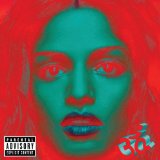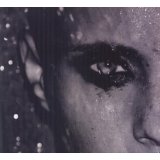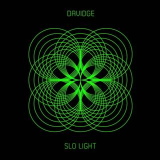 Smith & Mighty predate trip-hop by a couple of years or so, but their genre mix-up of soulful but downcast vocals and beats derived from hip-hop were a precursor to the sound that was to follow. They are still best known for their 1988 forlorn and slowly thumping cover versions of Burt Bacharach’s “Walk on By” and “Anyone Who Had a Heart”, massive club hits both of them. Neil Davidge was a core figure in trip-hop’s golden years, his most high profile work being on the second and third Massive Attack albums.
Smith & Mighty predate trip-hop by a couple of years or so, but their genre mix-up of soulful but downcast vocals and beats derived from hip-hop were a precursor to the sound that was to follow. They are still best known for their 1988 forlorn and slowly thumping cover versions of Burt Bacharach’s “Walk on By” and “Anyone Who Had a Heart”, massive club hits both of them. Neil Davidge was a core figure in trip-hop’s golden years, his most high profile work being on the second and third Massive Attack albums.
“Slo Light” is the title track from Davidge’s forthcoming album and features remote but yearning vocals by little-known New York-based Living Days singer, Stephonik Youth. The album version takes time to build from music box twinkles to threatening strings and in many ways is Davidge’s new version of “Teardrop”, the song he coaxed Elizabeth Fraser into recording for Massive Attack. Rob Smith’s remix stays close to the original version’s intentions, certainly in mood, but unsurprisingly amplifies the r’n’b elements with a persistent tom-tom drum effect to make this more of a post-club track rather than straight chill out. It’s starker than the album version and Youth’s vocals are more vivid and dominant and the push of melancholy is stronger and more immediate.
This excellent interpretation of one of Davidge’s most seductive tracks should whet your appetite for his very strong debut album, featuring Sandie Shaw and Cate Le Bon amongst others, coming early next month. I wonder if the involvement of Rob Smith indicates that Smith & Mighty may also return to the musical forum? That would be cause for a double celebration.
 I Break Horses sophomore album, “Chiaroscuro”, Italian for contrasting light and dark, is a very multi-layered and somewhat intense affair. Thick with manic hi-hats, synths and stereo-centric effects, melodies, when they do appear, are strong and compelling but half of the album forsakes this dominant foreboding mood, representing the extremes of the title in a way. “Hearts”, I Break Horses debut album, was released in 2011 and was also a thick and textured, atmospheric electronic album but was also significantly more optimistic and in many ways accessible than this follow up. There were also songs on their first album, only a couple, admittedly, that you could dance to and although “Chiaroscuro” contains tracks that may inspire you to move, there is nothing here that will leave you dehydrated.
I Break Horses sophomore album, “Chiaroscuro”, Italian for contrasting light and dark, is a very multi-layered and somewhat intense affair. Thick with manic hi-hats, synths and stereo-centric effects, melodies, when they do appear, are strong and compelling but half of the album forsakes this dominant foreboding mood, representing the extremes of the title in a way. “Hearts”, I Break Horses debut album, was released in 2011 and was also a thick and textured, atmospheric electronic album but was also significantly more optimistic and in many ways accessible than this follow up. There were also songs on their first album, only a couple, admittedly, that you could dance to and although “Chiaroscuro” contains tracks that may inspire you to move, there is nothing here that will leave you dehydrated.
Swedish electronic music is seemingly dominated by female singers making pop music which is beautiful, ten steps ahead of their European neighbours and both sad and joyous; Robyn is their leader. Maria Linden and Fredrik Balck relate to both the beauty and sadness but these Swedes have more in common with artists from the US label Italians Do It Better such as Chromatics and Glass Candy with Linden’s sweet but depressed, sometimes dead-eyed, delivery replicating the female leads of these groups. Musically, recent releases from School of Seven Bells and Nigel Godrich group Ultraista come close with their rave-punctuated, electronic disco for introverts but I Break Horses are often far more distant and harder to know.
“Chiarascuro” starts with the noir-like dramatic, piano-led, “You Burn”, a strong and slowly thumping Italian disco-influenced lead that doesn’t sound like any other song here. The next three tracks amplify the energy significantly and successfully and with “Denial”, the best of the trio, Linden’s dreamy vocals are initially attacked by stun guns, stuttering like a Stock, Aitken and Waterman twelve-inch and surrounded by syndrums that aren’t retro sounding but fresh and darkly pop. It really does sound great and, yes, sad and beautiful. The second half of the album does not replicate the first though. Linden and Balck have a distinct ability to create instant and exciting music but they then decide to pull back from this. With tracks like the seven minute, funereal “Medicine Brush” (with very Julee Cruise falsetto vocals thankfully adding some respite), the overly sombre “Berceuse” and out of focus, both melodically and sonically, “Disclosure” all reinforcing the sense of nothing really happening over a long (feeling) period of time. All is not lost though and album latecomer “Weigh True Words” reignites the spark and distortion of the earlier tracks and with its repetitious but thrilling house percussion and brilliant chorus, it’s the best tune of the album.
Ultimately “Chiaroscuro” is a somewhat uneven collection of nine tracks; the longer songs need to be shorter and vice-versa . The stronger poppier melodies can be frustratingly buried and, at nearly eight minutes long, the art-doom of “Heart to Know” is just very hard going indeed. Listen to this on a decent set of headphones though and there is still a lot of pleasure to be had and the humour in some of the diseased-sounding short synth motifs and computer game effects are thrilling. It may still be difficult to really understand what Maria Lindén is actually singing about but the lyrics aren’t the most important thing here. I Break Horses is really about mood and the album title is a clue to the strong contrast between the two sides of the album, the light may be under-represented but the point where the two collide can be dazzling.
 Angel Haze is an exciting prospect. The 22 year old rapper and sometimes singer from Detroit’s flow is like an exhilarating and effortless amphetamine hit; you hear her, you sit up and you ask ‘who?’ Her story is one of cult religions, abuse and an exploration of her sexuality and sexual orientation and how all of these things have resolutely not made her into a victim. After several mix tapes it was 2012’s unexpectedly diverse and brilliant “Reservation” and her covers EP “Classick”, both exploring all of these experiences, that guaranteed she could no longer go unheard. Her biggest hit to date, the skeletal and booming “New York” has now become a club essential and a classic in itself. So why exactly does “Dirty Gold”, Angel Haze’s first official album release sound like such a step backwards?
Angel Haze is an exciting prospect. The 22 year old rapper and sometimes singer from Detroit’s flow is like an exhilarating and effortless amphetamine hit; you hear her, you sit up and you ask ‘who?’ Her story is one of cult religions, abuse and an exploration of her sexuality and sexual orientation and how all of these things have resolutely not made her into a victim. After several mix tapes it was 2012’s unexpectedly diverse and brilliant “Reservation” and her covers EP “Classick”, both exploring all of these experiences, that guaranteed she could no longer go unheard. Her biggest hit to date, the skeletal and booming “New York” has now become a club essential and a classic in itself. So why exactly does “Dirty Gold”, Angel Haze’s first official album release sound like such a step backwards?
It may take a while to pull your already-established fan base along with you, but the decision to move from the relatively underground to the mainstream is not necessarily bad. It’s apparent after hearing the opening track, the scene-setting “Sing About Me” that Angel Haze wants to make it big as a crossover act; not as a rap artist or a hip-hop artist but as a pop star. Listening to recent interviews and the snippets of dialogue contained through “Dirty Gold” this indeed would appear to be Haze’s choice. Beginning with a sung chorus, shimmering synths and a repetitive R2D2 whistle, “Sing About Me”, is uplifting and pleasant but completely derivative r’n’b pop. With sing-song rapped verses, Haze encourages us to celebrate her success and this formula of sung chorus and rapped verse is repeated almost throughout the entirety of the tracks on “Dirty Gold”. On the third song, “A Tribe Called Red”, a trapped-out and dub-stepped rhythm supports Haze’s rap spit efficiently enough but then is completely compromised and crushed by the excruciatingly heavy-handed (sung) chorus telling the listener ‘Don’t give up…turn it around’. It already sounds dated; the EDM ticks, the histrionics and the self-empowering sentiment.
As if any further confirmation were required, the presence of omnipresent songwriter and pop star in her right, Sia, both singing and writing on “Battle Cry” (the hands in the air chorus actually states ‘lift your hands towards the sky’) and with production by equally in-demand Greg Kurstin (Kylie, Britney and Lily Allen), there is no doubt that Haze is aiming stadium big. But even with such dependable collaborators the overall sound of this is overwrought and clichéd, particularly in the slower and more ‘serious’ second half. The most obvious comparison is that of Nicki Minaj who, like Haze, released early mix tapes and through thunder-stealing features proved herself as a gloriously eccentric, genuinely witty and charismatic performer and then her debut “Pink Friday” appeared and it was sonically safe, overly sentimental and, worst of all, dull. The Minaj that was initially promised was not the Minaj delivered and the Angel Haze that we expected has similarly been mislaid somewhere in transit.
There are moments of “Dirty Gold” that do work well within this new format. The first single taken from the album, the Markus Dravs-produced (Bjork, Arcade Fire and Coldplay, amongst others) “Echelon (It’s My Way)” sounds fresh and relevant. It has the best chorus on “Dirty Gold” by some distance and its trap styling and deceptively shallow subject matter (fashion, basically) are pretty perfunctory – it’s pretty much the second instalment to ASAP Rocky’s “Fashion Killa” – but on an album that is looking for instant pop gratification and perfect hooks this does the trick very well. “Deep Sea Diver” has a tight groove and throbs and rattles like prime time Missy Elliott and “White Lilies/White Lies” has breadth and an epic feel that moves away from the more predictable structures found here with the spaghetti western-type loop and long instrumental fadeout adding atmosphere.
It’s maybe important to point out that the deluxe version of this album, and I am loath to review these ‘versions’, which are essentially just marketing tools and undoubtedly cynical, contains four of the most compelling, sonically-challenging and vibrant tracks contained under the “Dirty Gold” banner. Admittedly one of these is the previously-released “New York”, but listen to the baroque and oddly beautiful “Rose-Tinted Suicide” and marvel at what could (should) have been achieved. The decision to still include these tracks, albeit in this unabridged version of the album, confirms that the young star’s talent is still very much intact. It might be of course that Angel Haze herself wants to distance herself from these more nuanced and disturbing tracks but one can only hope that she changes her mind and finds again the bright light that’s hidden beneath the dirt here, the one that attracted us to her in the first place. The three-star rating is based on the Deluxe Edition.
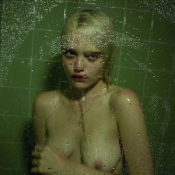 Although her first single appeared in 2010 Sky Ferreira has never released an album before. There appears to have been a lot of music recorded over a three year period, talk of albums near to completion and exciting collaborations, but very little has ever seen the light of day. It would appear that this is mainly due to Ferreira herself not being happy to release material that record companies and interested parties want her to release and therefore becoming an artist that certain sections of the music industry would rather not have to deal with. Either she is a highly volatile personality whose ego stands in the way of her producing consistently good material (hi Azealia!) or she is an artist in the more literal sense of the word who wants to only share material that she stands by. It’s satisfying then to hear, based on this new evidence, it is almost certainly the latter.
Although her first single appeared in 2010 Sky Ferreira has never released an album before. There appears to have been a lot of music recorded over a three year period, talk of albums near to completion and exciting collaborations, but very little has ever seen the light of day. It would appear that this is mainly due to Ferreira herself not being happy to release material that record companies and interested parties want her to release and therefore becoming an artist that certain sections of the music industry would rather not have to deal with. Either she is a highly volatile personality whose ego stands in the way of her producing consistently good material (hi Azealia!) or she is an artist in the more literal sense of the word who wants to only share material that she stands by. It’s satisfying then to hear, based on this new evidence, it is almost certainly the latter.
“Night Time, My Time” is a surprisingly taut guitar, drums and synths (in that order) album, with Ferreira herself sounding bright and pouting through the majority of it. The sexuality that informs the NSFW album sleeve portrait translates into the multi-harmonies that make up the wall of sound, mid-sixties girl group album opener “Boys”. The predominant electro-pop sound that runs through the majority of her previous releases does not dominate here and this collection sounds unlike anything else released by a female singer in 2013 who is within the genre of ‘pop artist’. Whilst not a retro album, the spirit of early Blondie, Joan Jett, Siouxsie Sioux and even Kim Wilde are alive and well and it’s these kind of stand-alone punk icons that Ferreira obviously feels a kinship with.
Ariel Rechtshaid (Charlie XCX, Vampire Weekend and Glasser), who produces the entire album, excels at creating wonderfully full soundscapes which bulge with intricate details and neat sonic flourishes (listen to Haim’s thrilling “My Song 5” for an example). On songs like the snarling “Nobody Asked Me (If I Was Okay)” and “Kids In America”-mugging “Ain’t Your Right”, Ferreira and Rechtshaid give “Night Time, My Time” a genuine indie rock-pop authenticity and power as a cohesive body of work and not just an exercise in producer placement. Regardless of whether acoustic specialist Jon Brion or pop god Greg Kurstin had taken the production reins here, as it was previously assumed they might (both have worked successfully with Ferreira before), none of this would work if the songs weren’t good enough, and Ferreira has always had an excess of brilliant tunes.
Fans who may possibly mourn the overall departure of more traditional pop songs like the towering, Kylie-like “One” from 2010 can still find solace here with three nuggets of airy and gleaming brilliance: “24 Hours”, “Love in Stereo” and, in particular, the defiant “I Blame Myself”. The latter finds Ferreira accusing her detractors ‘How could you know what it feels like to fight the hounds of hell? How could you know what it feels like to be outside yourself? You think you know me so well? I just want you to realise I blame myself for my reputation’. And that still doesn’t take into account “Kristine”, a real weirdo of a track, short with deliberately hard to decipher lyrics that seem to reference shopping with said Kristine and the young millionaires with an ever
ascending melody key-line and the admission ‘even though I’m not bright, I can live in the bright town’. Its craziness is unexpected and brilliantly realised.
Ferreira has said that the album’s title comes from a line spoken by the tragic character Laura Palmer in David Lynch’s feature length film “Fire Walk with Me”, more commonly known as Twin Peaks, or at least a less successful prequel to the hugely popular TV show of that name. There is an incredibly affecting scene in the film where Laura Palmer speaks about falling in space and how eventually you would burst into flames and the angels wouldn’t save you as they are all gone. A haunting insight into the lead character’s eventual death, Ferreira incorporates this dialogue into the title track’s lyrics; the bad girl punished by death. It’s a sombre close to an otherwise uplifting and exhilarating album and musically it’s lifted straight from Tricky’s 1995 trip hop classic, ‘Maxinquaye’. It’s sticky and drunken with Ferreira coolly accepting her potential fate. This track alone confirms the risks she clearly wanted to take with her first album, it’s impossible to imagine any one of pop’s golden girls making anything as desolate sounding as this; it’s how you may expect Lady Gaga to sound if you had only seen her.
“Heavy Metal Heart” may go precisely nowhere and “Omanko” takes a novelty turn in the wrong direction but this still doesn’t prevent Sky Ferreira’s album from being a massive achievement. Her current reputation as the hipster bloggers’ poster girl is troubling as it is questionable. How much of that is due to the music as opposed to the image of a seemingly nihilistic, with occasional low self-esteem issues, ex-model? This is a pop artist, though, and image is arguably as important as sound. What Ferreira has done with “Night Time, My Time” is that she has made a record where it isn’t necessary to rely on visual props to fully relate to and enjoy the music. In that way it seems quite old fashioned and there is little doubt whilst listening to it that she loves these songs and making them come to life. If you were impressed but unmoved by some of the bigger, shinier releases from the last four months of 2013, then this album may relieve some of your pessimism. She may have taken an age to do it and it’s very early to say, but Sky Ferriera may have made one of the best albums of 2014.
An artist who is consumed by his own obsession with culture, music and art, West has made the most startling album of his career so far. Where lyrical and sonic power collide magnificently, thematically “Yeezus” is an album about racism and ego and sex and sounds like nothing that you’ve heard from any of the rap or pops big players this year. Always one step ahead of every genre, West has made an album that incorporates brutal and beautiful techno, Nina Simone, Marilyn Manson and Daft Punk sounding like you wish they did on their own record. A collection that restores faith in creativity and the passion of self-expression; Kanye West really may be a god, just please don’t tell him.
In addition to changing their name and downsizing in 2013, NYPC (formerly known as New Young Pony Club) have somewhat surprisingly also released a brilliant record. Their self-titled third album is proof that the key members of this group needed to lighten the load somewhat in order to deliver what they’ve promising since 2005’s tasty ”Ice Cream”. This, their best album by some distance, is a master class in electronic pop music that has personality and class. Concise, muscular with divine melodies and gleaming electronics throughout, it puts the rather substantial competition in the shade.
Miley may have got their first with the “Bangerz” title but MIA’s outstanding fourth album is stacked to the ceiling with them. This was always going to be a difficult release as the critical spotlight had suddenly turned on the Sri Lankan-born and London-based rapper but instead of getting mad, MIA got ecstatic. Vocals that can sound like gunshots, delirious rhythms and textures and just one massive indie, world-rave bash after another; “Mantangi” is the most pure and celebratory representation of MIA to date.
 Sky Ferreira – “Night Time, My Time”
Sky Ferreira – “Night Time, My Time”
Oh, Sky, the ultimate 21st century pop star who never releases any music, until now, sort of. Still unavailable in the UK, Sky Ferreira’s debut album was finally released in some parts of the world in late 2013. Nearly four years in the making, it’s a far cry from her earlier electro pop, although traces remain if you listen hard enough. Sounding like it was recorded in 1978 and produced by Mike Chapman, the missing album between Blondie’s “Plastic Letters” and “Parallel Lines” would just about do it justice. A big, weird rock’n’pop album that entrances with liquid melodies and Ferreira’s ability to seduce just about anyone, this is music that was made for the Top of the Pops studio and a massive great hairbrush.
Some of the year’s most intricate and soulful music, and this is indeed an extremely musical album, can be heard on Anna Calvi’s intimate and daring second album “One Breath”. Partly because of the assertive and very academic use of an orchestra, Calvi has created songs which take expected turns into light and dark. Like a more feral and restless sister recording to Agnes Obel’s also excellent 2013 album “Aventine”, “One Breath” is both a dramatic and cathartic experience that firmly cements Anna Calvi’s place within the genre.
 The phrase ‘an acquired taste’ could have been made for Polly Scattergood. She has a little girl lost voice and a tendency to cast herself as a needy victim to such an extent that the preference may be to send her to a good psychoanalyst than indulge in her recorded confessions. Her self-titled debut included a song called “I Hate The Way” in which Scattergood listed all of the things wrong with her and included the line ‘not all men are bad and I’m not like your dad and I’ll hold you even though you’re slightly mad’ sung from the perspective of her boyfriend. But she can have a way with a tune and her best tracks were perverse and genuinely dark, atmospheric electro pop songs. “Arrows” picks on up the synth-pop element of her first collection and broadens it with ballads as contrast; this is an album that is more slow than fast, are just as black-hearted and desperate.
The phrase ‘an acquired taste’ could have been made for Polly Scattergood. She has a little girl lost voice and a tendency to cast herself as a needy victim to such an extent that the preference may be to send her to a good psychoanalyst than indulge in her recorded confessions. Her self-titled debut included a song called “I Hate The Way” in which Scattergood listed all of the things wrong with her and included the line ‘not all men are bad and I’m not like your dad and I’ll hold you even though you’re slightly mad’ sung from the perspective of her boyfriend. But she can have a way with a tune and her best tracks were perverse and genuinely dark, atmospheric electro pop songs. “Arrows” picks on up the synth-pop element of her first collection and broadens it with ballads as contrast; this is an album that is more slow than fast, are just as black-hearted and desperate.
“Wanderlust” has a Numanesque overarching synth and sounds like Goldfrapp at their squelchiest. It’s nice but derivative and the silky “Disco Damaged Kid” is one of the many songs here that builds into something very different from its first couple of minutes but fails to live up to the vivid imagery suggested in its title. “Falling” has a rougher New Order indie pop sound and “Machines” is a standout, a tender electronic ballad which builds to a convincing enough passionate climax. “Subsequently Lost” is probably the pop standout, a PSB type production, tight with an ‘I’ve subsequently lost my mind luv, apparently I’m going nowhere’ chorus which very much sums up Scattergood’s opinion of herself.
The album’s final track “I’ve Got A Heart” is appropriately heart-breaking; piano and synth chords, beautifully spaced out moments and also the confessional ‘the doctor gave me pills to take, to stop me feeling quite so awake’ line accompanied by strings which help play out the tracks final two minutes. If you don’t like this track then it’s unlikely that Polly Scattergood will be for you. Alternatively the piano led ballad “Miss You” crams in all of her less sympathetic aspects, lyrically and also in respect to performance. It’s whimsical and self-pitying with juvenile lyrics referring to bedroom floors and chimneypot-lined skies.
“Arrows” is an album that sees Polly Scattergood lose some of the things that made her debut oddly compelling. She is clearly attracted to melancholy and that dark disco aesthetic that’s loved by many similar artists but here she is both more diluted and obvious than before. The thing that marked her out as being different, her own relentless self-involvement and a singing style which manages to be downtrodden and girly, are still here but the songs let her down more often than not. The surreal flourishes of songs like “Nitrogen Pink” and “The Bunny Club” from her debut have been replaced by more straightforward song writing and themes and where Scattergood was very good at narrating these kinds of escapist fantasies she is less effective with these kitchen sink type scenarios. There is a place in the electro pop world for Polly Scattergood I’m sure but she many have to go back to her initial influences and eccentricities to push her way back through the very crowded door.
 I’ve had this track for a little while now, waiting for something else to appear that will reveal a little more about the upper case admiring duo and this much I do know; there are apparently two of them. But they have proved to be admirably elusive. Once based in London and now they live on unspecified island, allegedly, in order for them to create the very man-made sounding “Death”.
I’ve had this track for a little while now, waiting for something else to appear that will reveal a little more about the upper case admiring duo and this much I do know; there are apparently two of them. But they have proved to be admirably elusive. Once based in London and now they live on unspecified island, allegedly, in order for them to create the very man-made sounding “Death”.
A glacial and spinning electronic synth riff carries a tune which combines a male vocal reminiscent of Kele Okereke from Bloc Party at his most reflective and a soulful aesthetic similar to that of The Beloved’s late eighties chill-house anthem “The Sun Rising”. The lyrics are also oddly uplifting given the song’s title and when the vocal reassures ‘I’ll hold you in my hand when you cross over to the other side’; it all sounds quite lovely.
Whether HARTEBEEST turn out to be artists that we already know but have taken another route musically, and this could be a real option I feel, or if they are a new band which just wants to create some old fashioned mystery surrounding their identity remains to be seen. This would be an interesting introduction to either, not quite strong enough to lead an album campaign and more than an album track, “Death” sits somewhere in between. Can the real HARTEBEEST please come forward; we are interested to hear more.
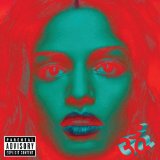 M.I.A. has gone through a bit of a hard time. Her last album “Maya” was not loved, she was accused of hypocrisy because she may or may not have consumed truffle french fries whilst being interviewed by The New York Times and her relationship with the obsessively revered Julian Assange (which is continued here) bothered some and problems with both her record company and her own marriage were publicly discussed. She is a fascinating artist, as unique and important as Bjork and, like Bjork, her work could only ever be hers. In respect to the first criticism at least, 2010’s “Maya” was widely slated as inaccessible, ugly-sounding and, the inevitable, ‘hard to love’. Even early musical partner Diplo expressed his concern about her apparent lack of judgement and choice of collaborators but this reaction was one that perplexed. Featuring her most brilliant pop moment ever with “XXXO”, a lovely cover version of Spectral Display’s “It Takes a Muscle” and “Born Free” with its insane ginger-haired army video and Suicide sample, the album was thrillingly eclectic and intricate. It differed from previous releases though, in that M.I.A. had strayed somewhat from sounding like her and this is what’s addressed in “Matangi”, M.I.A. sounds a lot like herself again.
M.I.A. has gone through a bit of a hard time. Her last album “Maya” was not loved, she was accused of hypocrisy because she may or may not have consumed truffle french fries whilst being interviewed by The New York Times and her relationship with the obsessively revered Julian Assange (which is continued here) bothered some and problems with both her record company and her own marriage were publicly discussed. She is a fascinating artist, as unique and important as Bjork and, like Bjork, her work could only ever be hers. In respect to the first criticism at least, 2010’s “Maya” was widely slated as inaccessible, ugly-sounding and, the inevitable, ‘hard to love’. Even early musical partner Diplo expressed his concern about her apparent lack of judgement and choice of collaborators but this reaction was one that perplexed. Featuring her most brilliant pop moment ever with “XXXO”, a lovely cover version of Spectral Display’s “It Takes a Muscle” and “Born Free” with its insane ginger-haired army video and Suicide sample, the album was thrillingly eclectic and intricate. It differed from previous releases though, in that M.I.A. had strayed somewhat from sounding like her and this is what’s addressed in “Matangi”, M.I.A. sounds a lot like herself again.
The title track, the first of many here produced by UK electro, fidget-house master Switch sees the pair reunited from the highly-acclaimed and successful “Kala” album, sounds like a continuation of the burundi beats, squawks and chaos of 2006’s “Bird Flu”. The two part time signature of “Come Walk With Me” comes from the same place as “Jimmy”, also from Kala, which M.I.A. remembers as being inspired by pop songs she heard on the radio as a kid. It’s exuberant and child-like and at odds with the majority of M.I.A.’s discography. “Attention” is vocodered, cut to ribbons, archetypal M.I.A and will irritate the hell out of some. Julian Assange helped her find as many words as possible that could contain the word ‘tent’, acounTENT’ being a favourite although she may be pushing it a bit with LoubouTENT shoes.
The skanking “Double Bubble Trouble” shockingly uses the lyrical hook from Shampoo’s massive pop brat hit from 1988 ‘Trouble’ and is conformation of the amount of fun that M.I.A. is having here. The lightness that was all over her debut album has certainly returned and on “Bring the Noize” and “Y.A.L.A.” she has created two of her biggest and brutish club tunes to date. Lyrically the rhymes do not stand up to close scrutiny, less political than ever before aside from the politics of being M.I.A.. “Boom Skit” talks about her most recent battle with the Super Bowl organisers and “Bad Girls”, sounds as elegant and fresh now as it did two years ago, is about, well, how bad she is.
“Matangi” tends to fall down somewhat with its mid-tempos. Where “Maya” had the gorgeous and spooky “Space” and “Kala” and the gargantuan “Paper Plans”, this has two (very similar) versions of the same song “Sexodus” and “Exodus”. Initially intended for Madonna, or at least offered to her but subsequently refused, it would have been interesting to hear the superstar’s take on this and her proven track record to pull out a melody would have come in useful here. Keeping the slower tracks bunched together at the album’s close only highlights the weakness of them musically and melodically; spaced out during the entire run of the album they may have been more welcomed as a breather from the relentless tempo and charged attitude. It’s only on the minimal, popping shuffle of “Lights” that M.I.A. sounds refreshed and intimate.
“Matangi” has been heralded as Mathangi “Maya” Arulpragasam’s most spiritual album to date and this statement may confuse but it is not as misleading as initially perceived. Lyrically it may not bare soul and penetrate in the way imagined but musically and rhythmically it references M.I.A.’s own culture as a London-born, Sri Lankan woman and it’s this sound that is at the forefront, left and right in every track. The chants, the percussion, the drums, the melody styles and, on “YALA”, the explicit statement, ‘If we only live once then why do we keep doing the same shit? Back home where I come from we keep being born again and again and again. That’s why they invented Karma’. On “Kala” she explored other cultures and sounds but this is M.I.A. reasserting her own sound and place in popular culture and music. It may not be as aggressively forward-sounding as some of her previous material but “Matangi” is a celebration of M.I.A.’s ability to provoke and assault in her most joyously sounding album to date.
 Opening to double handclaps, a spare hip-hop beat and a middle- eastern twang, Bulgarian born Denitza Torodrove, aka DENA’s, third single “Guest List” brings to mind MIA when she was fresh out of art school on her 2003 debut “Galang”. Also sharing the Grammy nominee’s anarchic political stance, DENA twists ‘everyone’s trying to get their name on the guest list’ to a double meaning; her music will be played in clubs where status can be everything but she is also directly referring to her native country’s immigration policies. Unlike MIA, DENA’s delivery is more relaxed and measured, eccentric swoops in her vocal delivery maybe but she’s no kooky novelty MC either.
Opening to double handclaps, a spare hip-hop beat and a middle- eastern twang, Bulgarian born Denitza Torodrove, aka DENA’s, third single “Guest List” brings to mind MIA when she was fresh out of art school on her 2003 debut “Galang”. Also sharing the Grammy nominee’s anarchic political stance, DENA twists ‘everyone’s trying to get their name on the guest list’ to a double meaning; her music will be played in clubs where status can be everything but she is also directly referring to her native country’s immigration policies. Unlike MIA, DENA’s delivery is more relaxed and measured, eccentric swoops in her vocal delivery maybe but she’s no kooky novelty MC either.
The track builds from its initial bare bones and features some lovely vibes and jagged, buzzing synth shards as it finds its alt-hip-hop rap feet. It is somewhat crude sounding and doesn’t come with the sonic bells and whistles we’ve come to expect with some American artists’ early releases, such is the level of sophistication coming through, but this is welcome in an overly producer-dominated genre.
DENA is a rare find indeed. Female Bulgarian rap artists aren’t dominating anywhere at present and she has enough cultural blends and savvy not to alienate a more far reaching audience ( her work is so far performed in English) with a clear understanding of how to captivate just the kind of audience who will embrace her (hipster alert!). Her debut album is out next year and my ears are ready and waiting.
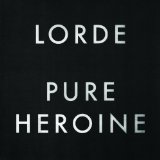 The troubling thing about Lorde is that she’s only sixteen, about to turn seventeen at the time of writing. This, her debut album, sounds like the work of someone in their mid-twenties which isn’t exactly middle aged either but the experience that comes with age does help reinforce artistic credibility, it seems. But this a prejudice and should therefore be discounted. Childhood and very early adulthood is experienced differently based on environmental and social factors and kids are no longer just kids; the definition has become blurred. Exposure to almost everything is effortlessly achieved whether you are in control of what you are experiencing or not and kids now worry about feeling too old, to quote Lorde here, at the age of 16. Her worry is our worry, her talent is that she knows how to create brilliant, massive pop songs.
The troubling thing about Lorde is that she’s only sixteen, about to turn seventeen at the time of writing. This, her debut album, sounds like the work of someone in their mid-twenties which isn’t exactly middle aged either but the experience that comes with age does help reinforce artistic credibility, it seems. But this a prejudice and should therefore be discounted. Childhood and very early adulthood is experienced differently based on environmental and social factors and kids are no longer just kids; the definition has become blurred. Exposure to almost everything is effortlessly achieved whether you are in control of what you are experiencing or not and kids now worry about feeling too old, to quote Lorde here, at the age of 16. Her worry is our worry, her talent is that she knows how to create brilliant, massive pop songs.
There are two very big songs on the seductive, and that it is the right word, “Pure Heroine”. The bigger of the two, “Tennis Court”, begins with Lorde asking the question ‘don’t you think that’s it boring when people talk?’ Although the statement itself is nonsensical without context, she has already stared you straight on and in the space of five seconds you’re captive. Against a bare hip hop beat, wide screen synths and the lonely sound of a repeated and dominant ‘blip blip’ from an imagined early computer game (Atari tennis would be topical of course), the steely-eyed verse can only serve as a perfect appetiser for the sublime chorus. Punctuated by a drunk and slowed down ‘yeah!’ borrowed from the current rap sound favoured by ASAP Rocky and already hijacked by Miley, Lorde is intoxicatingly confident and dominates the song’s boulder-like hook. Interesting that the current number one in the USA, the appropriately majestic “Royals”, and the second very big song here, is lyrically a reaction against hip hop culture which, in the States at least, is a dominant chunk of popular culture (see Miley again). It’s all rumbles and clicks, equal parts Peggy Lee, Lana Del Rey and Lykke Li (vocally they sound very similar, you would never imagine that Lorde is American let alone a New Zealander) but musically it’s as much a classic Rihanna song as anything else currently in the top ten, more “Umbrella” than “Only Girl in the World”.
The remaining eight songs on the self-written “Pure Heroine” are variations on the musical and lyrical themes established in these two songs and apart from a couple of misfires (the album closer ,”A World Alone”, is too heavy-handed in its attempts to demonstrate one of the album’s key subjects of alienation) the quality is very high throughout. The cleverly repetitious “Ribs” is the only track with a recurring and solid dance beat but is drenched in teen melancholy and on the booming and hypnotic “Team”, Lorde lyrically avoids the tirelessly reproduced ‘up in the club’ line by announcing ‘I’m kinda over being told to throw my hands in the air’. “Glory and Gore”, probably owing the most to Del Rey (the ultimate magpie) divides verses up sonically between hip hop via The XX cut with indie pop percussion practices of seemingly banging hard on a saucepan. These clever and effective musical tricks, and there are many, help what could have been a samey-sounding set remain fresh and inventive. “White Teeth Teens” has a 60’s girl group roll and sneer until the confessional line ‘I’ll let you into something big, I’m not a white teeth teen, I tried to join but never did, the way they are and the way they seem; it’s something in the blood’. “Buzzcut Season” contains the lovely line ‘I remember when your head caught flame, it kissed your scalp and caressed your brain’ and demonstrates Lorde’s skill with words, lyrics that can create a fluid and beautiful image.
The worldwide success of Ellie Maria Lani Yelich-O’Connor, her real name, puts her in the post, post-modern situation of becoming what she appears to at least mock here and, at times, hate. A star who is, because of her ability to not only perform but also write and reproduce, is a highly desirable commodity. There is an innocence to Lorde’s “Pure Heroine” which she will be unable to return to, her school friends and their anti-gang, their language and rejection of the mainstream; now she is the mainstream. Her ability to compose and express these experiences in such an accessible and grounded but haunting style may be her downfall but our gain. Ultimately Lorde will just have to decide just how far she wants to go as at the moment there really would appear to be no limits for this extremely talented and intriguing young woman.




